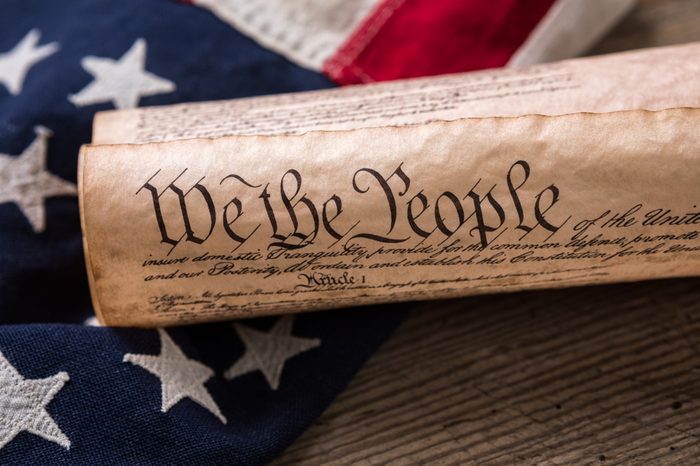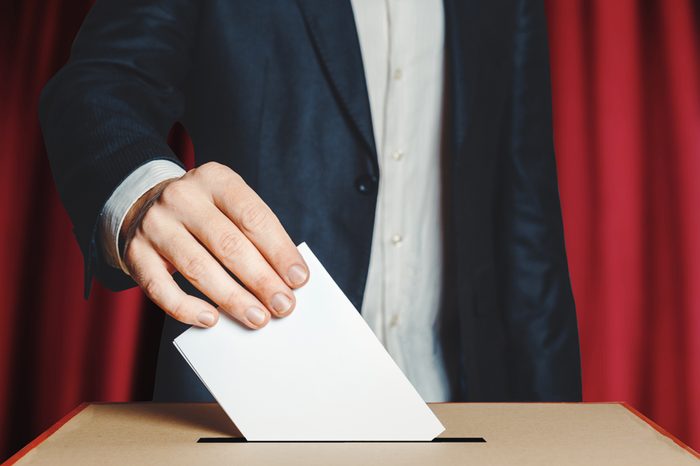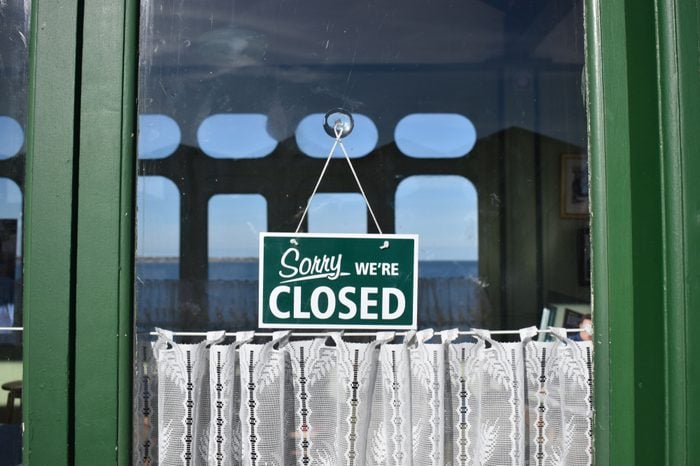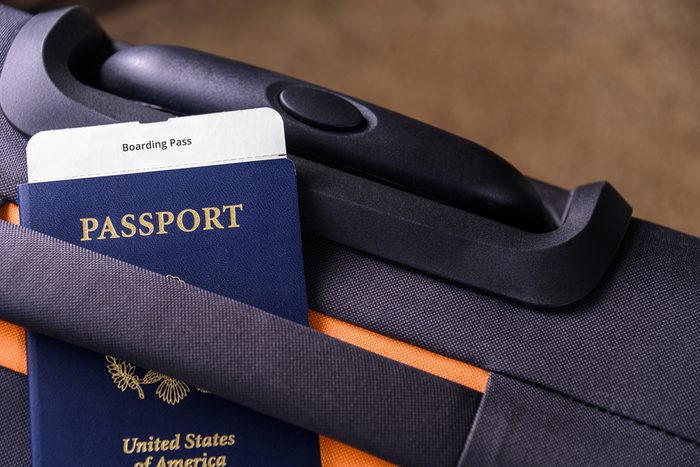
Force you to sell your home
As Americans, we have the inalienable right to enjoy life, liberty, and the pursuit of happiness without unreasonable government interference. But that doesn’t prevent the powers that be from forcing you to sell your property to the government if they deem it necessary. This principle is known as “eminent domain” and it derives from the Fifth Amendment to the Constitution (the “Takings Clause”). Find out about these 10 secret U.S. government operations that have been revealed.

Amend the Constitution
That glass of wine you enjoy with supper? It was illegal between 1920 and 1933 when Prohibition was in effect, thanks to the 18th Amendment to the Constitution. (The 21st Amendment repealed Prohibition.) Amending the Constitution isn’t easy—it requires a two-thirds vote in both the House and the Senate—but it can and has been done. If the President doesn’t follow the Constitution, it can even lead to impeachment and removal from office. To date, 27 amendments have passed, including the Bill of Rights. Find out some facts and figures about the U.S. Constitution that even history buffs might not know.

Take your things—without compensation
Civil asset forfeiture laws allow the police to seize your personal property and never give it back. They just have to have reason to believe it was involved in the commission of a crime—even if the person wasn’t convicted. In 2013, police in Indiana took a man’s $41,000 Land Rover after he pleaded guilty to selling less than $400 worth of drugs. However, whether this is justified is in question at the moment now that the U.S. Supreme Court agreed to review the case. Read about some hilarious court cases you won’t believe are real.

Search your trash
Law enforcement is permitted to search your trash, even before it gets taken by sanitation workers to the dump, according to attorney Randolph Rice. In a 1988 case, the Supreme Court decided that garbage placed by the curb isn’t covered under the Fourth Amendment (protection from unreasonable search and seizure). Animals, kids, and snoops can easily sift through your trash, the judges concluded, so it’s unreasonable to require the police to get a search warrant. Check out 50 bizarre things that are still banned in the United States.

Pardon felons
The power of the president to pardon convicted criminals may be something we’re used to hearing about, but it sounds awfully bizarre the way attorney David Reischer, founder of legaladvice.com, breaks it down for us: “A person is convicted of a crime before a jury of 12 of their peers, which has heard all the facts. A judge who knows the applicable law has sentenced the person. The law’s been applied and the people have spoken. Then the president says, ‘nope,’ and the person gets off scot-free.” Check out 45 more things you never knew about U.S. presidents.

Stop you from starting your car
If you’ve been convicted of DUI (driving under the influence), you could be required to install in your car a device that tests your blood alcohol concentration before you can start your engine. When you want to drive, you have to first blow into the device. If you’re over your state’s legal limit, the ignition won’t start. If you dare, learn about how the government really spends your tax dollars.

Take away your right to vote
Your right to vote is not inalienable. In most states, convicted felons lose the right to vote, at least during incarceration. In 14 states, you can vote as soon as you’re out of prison. In others, you might have to wait until you’ve finished parole and probation, or send the state government an application requesting your voting rights back. Find out the answers to these political questions you’ve been too embarrassed to ask.

Read your emails
U.S. intelligence agencies can collect email communications of foreigners living abroad in order to obtain information regarding potential threats against the United States; this can, in theory, extend to all Americans receiving these emails. This law was enacted in 2008 and was extended for another six years in January 2018. For some more secrets, check out these things FBI agents don’t want you to know.

Keep you from finding out the truth
The Freedom of Information Act allows anyone to request access to federal agency records… unless those records are protected from disclosure. And a lot of records are protected. Certain law enforcement records are protected, as are classified information about foreign policy, information regarding bank supervision, trade secrets, and more. That’s why we still don’t have all the information on John F. Kennedy’s assassination.

Make it very hard for you to go out of business
Every state has at least one crazy law that you can’t even believe is on the books. And that’s because the Constitution grants states the power to make laws as they see fit—provided the law doesn’t violate the Constitution. That’s why Milwaukee, Wisconsin, can make it expensive and complicated to go out of business: You have to purchase a pricy license, submit a huge pile of paperwork, plus pay a fee. So far, Milwaukee’s law is still considered constitutional. Don’t miss the other 50 dumbest laws from every state.

Give visiting rights to grandparents
Illinois has a law on the books that gives grandparents the official right to see their grandchildren. Family law attorney Russell Knight says there’s something even stranger about this law: It’s almost unenforceable because the parents can still say no. But if the grandparent had a good relationship with the child for at least a year before the parents cut ties, the grandparent can file to overturn the parents’ wishes. Did you know about these ways the government could be spying on you?

Jail a parent if a kid misses school
In Maryland, the state has the power to put parents in jail if their child misses school, according to Rice—it’s known as the Truancy Law of Maryland. The guardian can’t be blamed if a hooky-playing teen is 16 or older, but it sure puts extra pressure on kids to go to class. Check out these fun facts about our center of government, Washington, D.C.

Pressure your state to change its laws
Despite states’ rights, the federal government can pressure states to change their laws. They can do this by enacting federal laws that supersede local statutes and punish states for not complying. For example, in 1984, Congress passed a law (the National Minimum Drinking Age Act) that requires states to set the legal drinking age to 21 or older; otherwise, the states would lose 10 percent of their federal highway funding. Still, some states allow under-21s to drink under certain circumstances, such as with a parent’s permission. Check out 13 of the strangest liquor laws in the United States.

Shut the country down
If the government can’t pass a budget, it will shut down, and a lot of things we take for granted simply stop in their tracks. For example, national parks, monuments, and museums (including Smithsonian museums) close. If you’re waiting on a passport or visa, you’ll be out of luck until the budget is resolved. The threat is far from theoretical—the U.S. government shutdown as recently as December 2018. Find out about 11 unusual things that presidents have banned from the White House.
Sources:
- FindLaw.com: “Asset Forfeiture Laws by State”
- Forbes: “Can State Governments Impose ‘Excessive Fines’, Treat Citizens Like Walking ATMs? Indiana Says Yes”
- Forbes: “Supreme Court Will Decide If Civil Forfeiture Is Unconstitutional, Violates The Eighth Amendment”
- Randolph Rice, founder of Rice, Murtha & Psoras Trial Lawyers
- Oyez.org: “California v. Greenwood, 1988”
- David Reischer, attorney & founder of LegalAdvice.com
- Guardian Interlock: “What To Expect When You Install a Car Breathalyzer”
- CNN: “What Is Section 702 of FISA, Anyway?”
- Politico: “Trump signs surveillance extension into law”
- U.S. Department of State: “The Freedom of Information Act”
- Wisconsin Law Journal: “Regulations show states have duty to protect economic liberty”
- Russell Knight, attorney & founder of the Law Office of Russell D. Knight
- Illinois General Assembly: “Bill Status of HB1414”
- People’s Law Library of Maryland: “Truancy”
- AlmaAdams.gov: “Federal Government Shutdown: Frequently Asked Questions”
